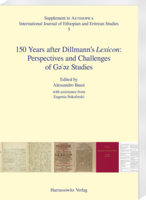|
|
more titles of the subject:
Download:
Please note: With adding digital Products to your cart
the payment will be handled via PayPal. The download will be provided after the payment is confirmed. The volume contains eleven essays which cast a look on the past, present, and future of Gə'əz (Classical Ethiopic) philological and linguistic studies on the occasion of the 150th anniversary of the achievement of the Lexicon linguae Aethiopicae by August Dillmann, published in 1865.
Most of the essays were presented at a conference convened by the ERC-project TraCES at the University of Hamburg in November 2015. On the one hand, they focus on the significance and importance of the Lexicon and of its author who was one of the greatest orientalists of the nineteenth century. Dillmann’s Lexicon has marked in-depth the development of Ethiopian and oriental studies. It still remains an indispensable tool for the analysis of Gə'əz style and phraseology, even though it has been surpassed by Wolf Leslau’s Comparative Dictionary of Ge'ez (1987), with respect to etymology and number of entries. On the other hand, the essays define more precisely which are (besides the obvious updating) the challenges posed by manuscripts, text editions, and epigraphic evidence emerged since 1865, with regard to Gə'əz language, orthography, lexicon and lexicography as well as digital humanities and corpus linguistics. The contributors are Maria Bulakh, Wolfgang Dickhut, Andreas Ellwardt, Serge A. Frantsouzoff, Martin Heide, Susanne Hummel, Manfred Kropp, Eugenia Sokolinski, Agostino Soldati, Cristina Vertan, Stefan Weninger, and Alessandro Bausi, who is also the editor of the volume. |
|||||||||||||||||||||||||||||||||||||||||||






